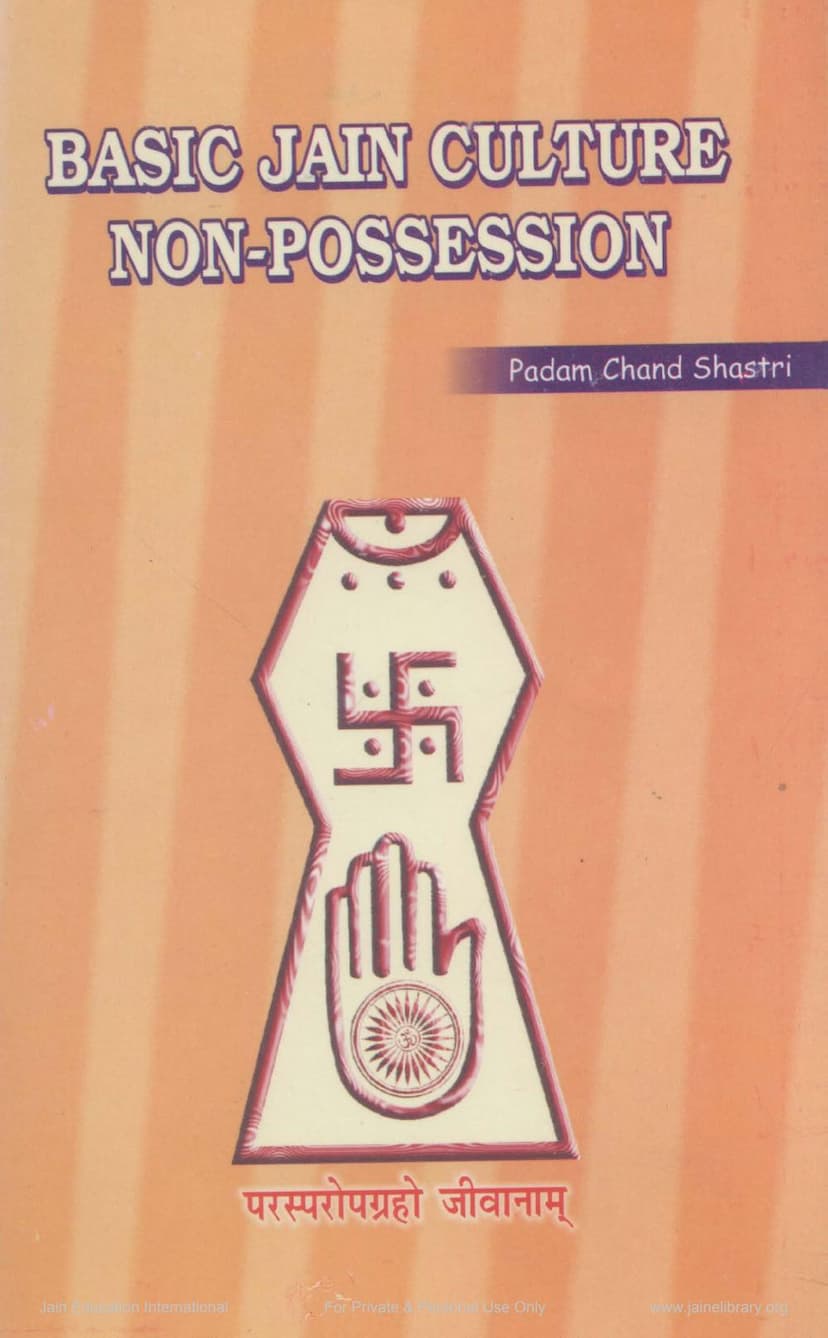Basic Jain Culture Non Possession
Added to library: September 1, 2025

Summary
This summary is based on the provided text, which appears to be the English translation of "Basic Jain Culture: Non-Possession" by Padamchand Shastri.
Overall Theme:
The central argument of the book is that Non-Possession (Aparigraha) is the foundational principle and the very essence of Jain culture, from which other virtues like non-violence, truthfulness, etc., logically stem and derive their significance. The authors contend that a deviation from this core principle has led to a decline in true Jain practices and identity.
Key Concepts and Arguments:
- Defining Jain Culture: Jain culture is defined as the "stream of Jina precepts," aiming for purification. It is seen as beginningless and endless, rooted in the innate nature of pure souls (Jinas). Unlike sect-based cultures, Jain culture, at its core, is about the unifying nature of the soul.
- Non-Possession as the Root: The book strongly asserts that non-possession is the primary and most crucial aspect of Jainism. It's not just one virtue among many; it's the foundation upon which other virtues are built.
- Possession as the Origin of Sins: The text argues that all sins and vices (violence, falsehood, stealing, etc.) originate from possession, both internal (attachment, aversion, delusion) and external (material wealth). The resolve of "this is mine" ("myness") is identified as the root of all possessions and subsequent sins.
- Interconnectedness of Virtues and Non-Possession: Virtues like non-violence, truthfulness, non-stealing, and celibacy are presented as either direct results of or instruments for achieving non-possession. For example, true non-violence is only possible when one renounces possessions, as violence often arises from the desire to protect or acquire them.
- The Ideal Jain vs. Modern Practices: The book criticizes the modern tendency to focus on external rituals or specific virtues like non-violence, donation, or compassion while neglecting the fundamental principle of non-possession. This leads to a superficial adherence to Jainism. The authors suggest that many current practices are "possessive" in nature, even if they appear auspicious.
- The Meaning of Vows (Vratas): Vows, according to Jain philosophy, are not about engaging in virtues but about desisting or abstaining from sins and possessions. The path to liberation involves disengagement from worldly activities and possessions.
- The True Nature of Jinas and Jains: Jinas (victors) are those who have completely won over karmas and attachments, thus achieving total non-possessiveness. Being a "Jain" is understood as following the path of the Jinas, which fundamentally means cultivating non-possession.
- Sects and Non-Possession: The book touches upon the historical schism between Digambaras and Shvetambaras, suggesting it originated from differing interpretations and emphasis on non-possession (Digambaras emphasizing total, finer non-possession, including external aspects, while Shvetambaras focusing more on internal aspects).
- Meditation and Non-Possession: True meditation, in the Jain context, is intrinsically linked to non-possession. It is about abiding in the self, free from all external attractions and mental processes, which ultimately leads to karmic stoppage and shedding, not just mental pacification through focusing on an object.
- The "Bitter Truth": The author shares a personal anecdote highlighting that true Jainism is not just about being born into a Jain family but about embodying the principles, particularly non-possession. The goal is to become a "Jina" by renouncing possessions and attachments.
- Societal Implications: The authors lament the lack of societal and governmental recognition for excessive accumulation of possessions as an offense, suggesting that addressing this issue could lead to greater peace and reduced crime.
In essence, the book advocates for a radical re-emphasis on non-possession as the cornerstone of Jain identity and spiritual practice, arguing that a true Jain is one who strives for the renunciation of all forms of possession.